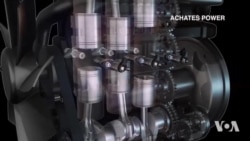Internal combustion engines in cars may be on their way out, but experts agree it will take a few decades before electric-powered vehicles become dominant. Meanwhile, the existing gas and diesel engines can be made more efficient and less polluting. With a $9 million grant from the U.S. Department of Energy, a U.S.-based company is using an old technological concept to build a power train that is 50 percent more fuel-efficient and just as powerful as conventional engines.
This little engine looks like it has only three pistons, but in fact, it has six, sharing only three cylinders.
With the help of modern technology California-based Achates Power has given new life to the concept of the opposed-piston engine, mostly abandoned after the second World War.
“With the opposed-piston engine, you're able to achieve the efficiency of a much larger engine in a much smaller package," said Fabien Redon of Achates Power.
An opposed-piston engine is a two-stroke engine with separate oil flow. It has no cylinder heads and no valves, both sources of considerable loss of heat and power in conventional combustion engines.
Two pistons move against each other in the cylinder, compressing a fuel-air mixture, which self-ignites, pushing the pistons apart, generating power.
Exhaust gases escape through ports in the cylinder walls.
Stripped of many conventional engine parts, the opposed-piston engine is inexpensive and simple to manufacture.
“We make sure that we do not over scavenge and achieve a very good combustion efficiency, so that unburned hydro-carbons and the emissions are reduced to a great extent," said Redon.
Larger opposed-piston engines have long been used for military and other applications. But developing them for consumer vehicles was not easy.
“This combustion strategy has some difficulties and weaknesses at low loads, because it needs a certain level of temperature inside the combustion chamber to make sure that the gasoline gets ignited," said Redon.
Achates Power, together with Argonne National Laboratory and Delphi Automotive, say they are sure they will overcome the obstacles, and by 2018 will have a 50 percent more efficient three-liter three-cylinder engine that will be suitable for passenger cars and trucks.





